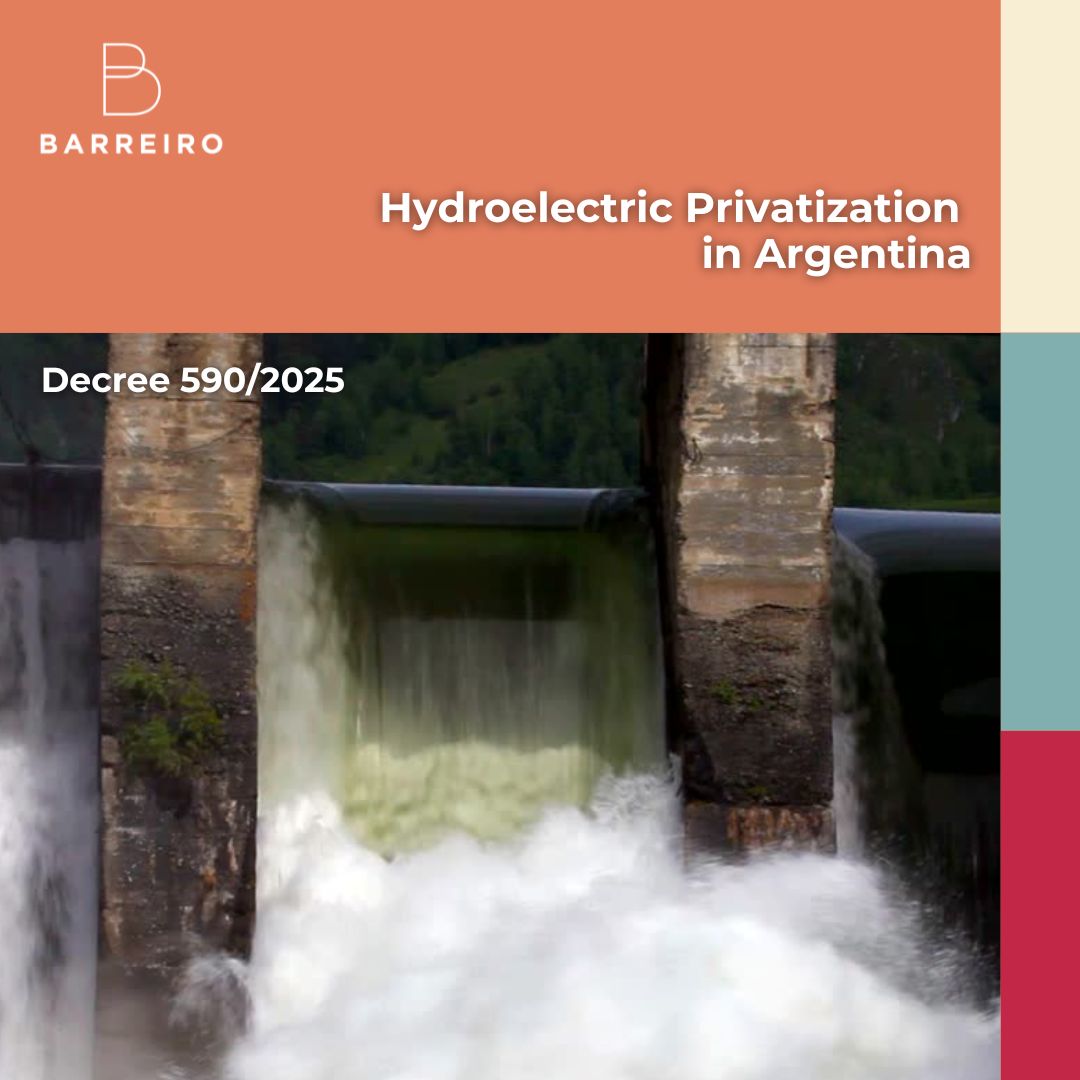Hydroelectric privatization in Argentina: Key Points of Decree 590/2025

Analysis of Decree 590/2025
Regulatory Context
Decree 590/2025 is part of a long-standing process of structural reforms in the Argentine energy sector. It draws on key legal frameworks:
-
Law 15,336 and Law 24,065 → Electricity regulatory framework, distinguishing generation, transmission, and distribution.
-
Law 23,696 on State Reform → Legal basis for privatizations.
-
Law 27,742 (Bases Law) → Authorizes the privatization of state-owned companies, including ENARSA.
In the 1990s, HIDRONOR S.A. was privatized, and its hydroelectric assets were divided into four units: Alicurá, El Chocón-Arroyito, Cerros Colorados, and Piedra del Águila, each granted under 30-year concessions. These contracts have now expired, requiring the State to decide how to proceed with operations.
Purpose of the Decree
The decree pursues two central objectives:
-
Transfer and privatization
-
Authorizes the transfer of shares in the hydroelectric companies created by ENARSA and NASA to the Secretariat of Energy for privatization purposes.
-
Enables the sale of those shares through a National and International Public Tender without a floor price (i.e., no minimum reference price).
-
-
Transitional operational continuity
-
Establishes that the current concessionaires (Orazul, Enel, AES, and Central Puerto) may continue operating until 12/31/2025 or until the sale is finalized.
-
Imposes a minimum obligation of 90 days of continued operation for any concessionaire that does not adhere.
-
Conditions for the Concessionaires
Companies that agree to continue operating under this scheme must:
-
Comply with their original 1993 concession contracts.
-
Maintain a minimum guarantee of USD 4.5 million.
-
Accept potential changes in the remuneration scheme (without claiming State default).
-
Pay royalties to the provinces of Neuquén and Río Negro.
-
Submit bimonthly inventories of assets and equipment.
-
Grant access to potential bidders interested in the public tender.
Deadlines and Procedure
Within 60 days, the Ministry of Economy, together with the Agency for the Transformation of State-Owned Enterprises, must call the public tender for the sale of share packages.
The tender will include detailed annexes: concession contracts, environmental regulations, water management rules, dam safety requirements, asset inventories, and investment obligations.
Institutional Roles
-
Ministry of Economy → Regulatory Authority, with broad powers to regulate, supervise, and set tender guidelines.
-
Secretariat of Energy → Executes the share transfer and exercises oversight authority in the sector.
-
Agency for the Transformation of State-Owned Enterprises → Coordinates the sale process.
-
Provinces of Neuquén and Río Negro → Key stakeholders regarding royalties, basin use, and interjurisdictional participation.
Repeal and Regularization
The decree repeals Decree 564/25, citing formal defects in the supporting report that had endorsed privatization. The new act remedies these deficiencies while maintaining consistency with the Bases Law’s guidelines.
Opinion
Decree 590/2025 marks a decisive step in the government’s current energy privatization policy. It reflects three priorities:
-
Ensuring continuity of electricity supply → avoids a management vacuum by extending temporary concessions to current operators.
-
Opening control to private capital → seeks to attract investment through a competitive international tender without a minimum price floor, raising concerns about protection of public assets.
-
Strengthening the role of the Ministry of Economy → consolidates regulatory and supervisory authority, which could speed implementation but also reduces institutional checks and balances.
While the decree provides legal predictability and a structured transition framework, the absence of a base price poses undervaluation risks. Its success will hinge on how mandatory investments and environmental commitments are defined to ensure the process is not reduced to a mere transfer of strategic assets without a genuine plan for sustainable energy development.
Conclusion
Decree 590/2025 represents progress in institutionalizing the privatization process, but its outcome will depend on the transparency of the tender, the State’s capacity to oversee future operators, and achieving a balance between attracting private capital and safeguarding the public interest in a strategic resource like hydroelectric energy.